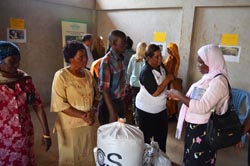|
We were delighted to share some of the excitement of N2Africa in action with Sara Boettiger, Deputy Director for Agricultural Development (Farmer Services and Systems), her Program Assistant, Mallory Robinson and our very own Senior Project Officer, Charlene McKoin. Our visit began with a courtesy call to Hon. Daudi Felix Ntibenda, the Regional Commissioner for Arusha. He assured us that the Tanzanian Government is an active partner in all our activities in rural areas and wished us a productive visit. Photo: Hon. Daudi Felix Ntibenda, the Regional Commissioner for Arusha shaking hands with Sara Boettiger, a Deputy Director at the Bill & Melinda Gates Foundation. Charlene McKoin is on the left, Mallory Robinson on the right. |
 |
Over the next two days, we visited farmer groups and individual farmers who work with N2Africa and partners in production and marketing of common bean in Hai and Moshi Districts, both on the slopes of Mount Kilimanjaro. The main entry points are two-fold: assistance with improved seed inputs and demonstrations of better agronomic practices that enhance yields. N2Africa works closely with Faida Mali, an NGO that specializes in assisting farmers in marketing. The Director of Faida Mali, Tom Silayo introduced the farmer groups in the field and at the crop storage facilities of the Kware Saving and Credit Cooperative Society (SACCOS). The group had prepared a demonstration on the use of Purdue Improved Crop Storage (PICS) bags to prevent post-harvest losses without the need for agrochemical treatment of the grain. The PICS bags have not been used earlier in this area and the farmers were very curious to see how they worked to kill storage pests such as Bruchid beetles.
|
Left: N2Africa farmers at Sanya Station Village, Hai District with the foundation officers |
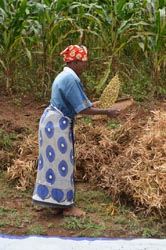 |
Right: Bernadette Majebelle demonstrating the PICs storage bags to Mwantumu Omari |
Middle: Farmer winnowing common bean variety Uyole njano at Upendo, Moshi District
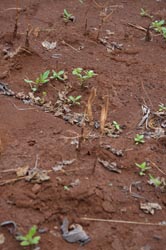 |
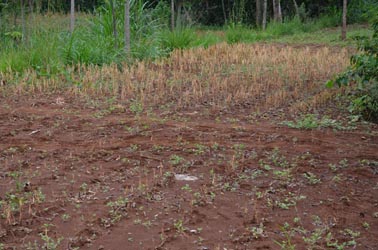 |
 |
Photo series: An impressive farmers’ adaptation trial at Upendo, Moshi district. The plot in the foreground received no manure or fertiliser whereas the common beans at the back received PK fertiliser.
We spent a lot of time discussing the opportunities and constraints with farmers. N2Africa is working with Farm Radio International and other partners to identify which common bean varieties have the best market opportunities. There is particular interest in a fast maturing, yellow, round-seeded common bean variety known as "soya njano" which fetches a premium price as it is very popular throughout Tanzania. Consumers particularly like this variety due to its good taste and quick cooking time, but above all because it causes less "gas" (flatulence). One lady farmer Mrs. Lenna, had experimented with growing soya njano on a small plot but was so impressed with the premium price she received that she had expanded to three acres in the current season.
Challenges that N2Africa had helped to overcome through the collective marketing were to get better prices for farmers. In particular the farmers highlighted the use of standard measures as there are pervasive problems of fraud in crop marketing by buyers. The season was unusual (when is there a normal season?) with heavy cloud and rain persisting when the crop should be drying. Beans were badly affected by a range of fungal diseases - including powdery mildew (which the farmers call ‘baridi’ because it looks like frost on the leaves). This remains a challenge for N2Africa to address in future.
We were surprised that all of the N2Africa farmer groups spontaneously mentioned how useful they found the "Listening Post" programmes on Radio Free Africa. These programmes are the result of a very recent collaboration between Farm Radio International, N2Africa and other partners (see article below) and it was encouraging to hear the positive farmers response.
|
The final stop on the tour was to the Nelson Mandela African Institution of Science and Technology (NM-AIST), where Sara Boettiger together with the Deputy Vice Chancellor Prof Patrick Ndakidemi, officially commissioned the glasshouse that has been constructed with funds from N2Africa. |
 |
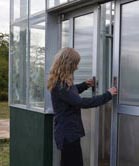 |
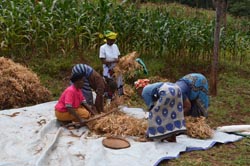 |
The foundation delegates met N2Africa MSc student, Yusuphu Namkeleja who explained his work on rhizobium populations to better understand the need for inoculation. Summing up at the end of the visit Sara Boettiger thanked Freddy Baijukya, Mwantumu Omari and partners for hosting the visit. She commented on the quality and scale of their work in implementing such a complex project as N2Africa. Photo: Harvesting beans from a demonstration at Upendo village, Moshi District |
Freddy Baijukya, Fred Kanampiu and Ken Giller


